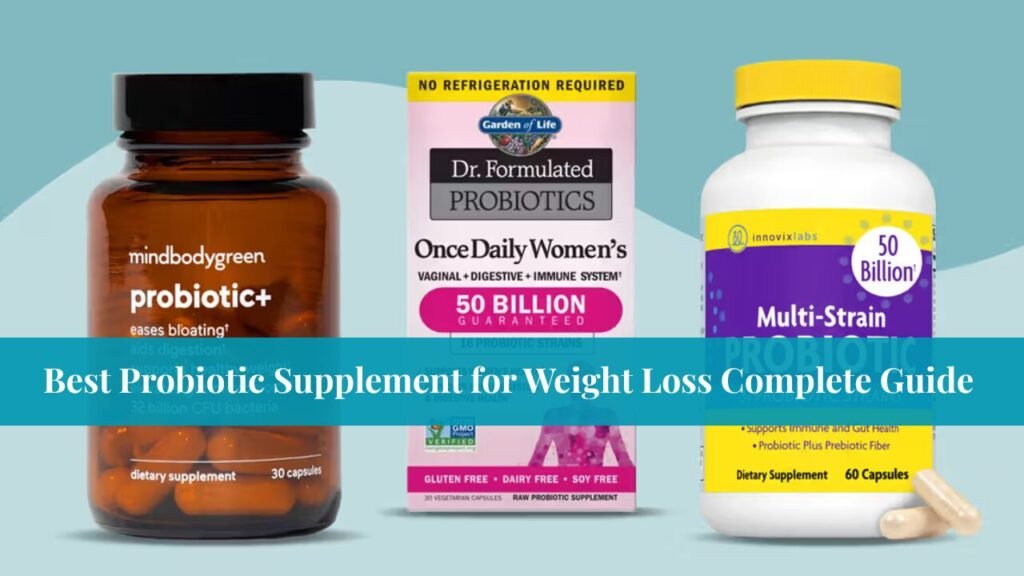Probiotics are live microorganisms, such as bacteria and yeast, that can offer significant health benefits when consumed in the right amounts. You’ll often find them in fermented foods like yogurt, kimchi, sauerkraut, and kefir, but they also come in supplement form. These supplements are designed to support a range of health goals, including weight management.
These good bacteria work to maintain a balanced gut microbiome a complex community of microbes that live in your digestive system. A healthy gut microbiome plays a crucial role not only in digestion but also in mood regulation, immunity, inflammation control, and even weight management.
Types of Probiotics
Different strains of probiotics are known for supporting various functions in the body. Some are helpful for digestion, while others can influence weight and metabolism. For example, certain types help people digest lactose or manage symptoms of irritable bowel syndrome, while others support immune function and reduce bloating.
One well-known probiotic strain is Saccharomyces boulardii, a yeast that has been studied for its ability to help with digestion and diarrhea. These variations make it important to choose a supplement with the strains that suit your personal health needs.
How Probiotics Influence Weight Loss
Research has shown that gut health is closely connected to many bodily processes, including metabolism, appetite control, and fat storage. A well-balanced gut microbiome may influence how your body stores fat and how hungry you feel throughout the day.
Probiotics can also support weight loss by reducing inflammation in the body, which is often a hidden factor behind weight gain. Certain strains are even capable of increasing your metabolic rate or producing compounds that help you feel full, making it easier to control cravings and reduce calorie intake.
Scientific Evidence
Several specific strains have been studied for their weight loss benefits. For example, Lactobacillus gasseri has been shown in a Japanese study to help participants lose nearly 9% of their abdominal fat in just 12 weeks. Another strain, Lactobacillus rhamnosus, helped women lose significantly more weight than those taking a placebo.
Similarly, Bifidobacterium breve has shown promising results in reducing body fat and improving cholesterol levels. These strains offer a science-backed foundation for choosing the right probiotic supplement aimed at supporting healthy weight loss.
Top 5 Best Probiotic Supplements for Weight Loss in 2025
One standout in 2025 is Boxing Essential Daily Synbiotic. This supplement includes 24 clinically-studied strains and is designed to support both metabolic health and the integrity of the gut barrier. It uses a 2-in-1 capsule to ensure that the bacteria survive the journey through your digestive system, arriving in the colon where they are most effective.
Ritual Synbiotic+ is another strong option, containing well-researched strains like LGG and BB-12. It’s known for its digestive and immune support, thanks to its delayed-release capsule and subtle mint flavor. BioFit Probiotic includes seven strains and adds medium-chain triglycerides (MCTs), which may further aid fat loss and digestion.
Culturelle Metabolism + Weight Management relies on Lactobacillus rhamnosus GG to assist with weight management. This formula also includes green tea extract to support fat metabolism. Garden of Life Dr. Formulated Probiotics Fitbiotic rounds out the list, featuring 14 different strains and an organic prebiotic fiber to help reduce occasional bloating while promoting gut health.
Key Ingredients
When choosing a probiotic supplement, it’s essential to pay attention to the specific strains included. Strains such as Lactobacillus gasseri and Lactobacillus rhamnosus have been linked to weight loss and reductions in belly fat. Bifidobacterium breve is another research-backed option that may help alter how the body stores fat.
Many effective products also include prebiotics, which are types of fiber that feed the good bacteria in your gut. Some supplements feature a delayed-release capsule design to make sure the probiotics survive stomach acid and reach your intestines. Enzymes may also be added to assist with breaking down food more efficiently, improving digestion and nutrient absorption.
How to Choose the Right Probiotic for Weight Loss
Choosing the right probiotic supplement involves more than just picking a popular brand. You’ll want to make sure the product includes strains that have been researched specifically for weight loss. Look at the CFU count, or colony-forming units, to ensure you’re getting an effective dose generally 10 billion CFUs or more is recommended.
Transparency is another key factor. A quality brand will clearly list the strains and dosages on the label. Check for third-party testing as a way to confirm the supplement’s purity and quality. If you have food sensitivities, it’s also wise to check whether the supplement is free from allergens like gluten, soy, or dairy.
Red Flags to Avoid
Not all probiotic supplements are trustworthy. Avoid products that don’t list the specific strains included or only offer vague CFU numbers. Another warning sign is the use of proprietary blends without disclosing individual strain dosages, making it impossible to verify their effectiveness.
You should also be cautious of supplements that lack clinical studies or fail to undergo third-party testing. These omissions could indicate poor quality control or ineffective formulas that won’t deliver the results you’re looking for.
Diet and Lifestyle Tips to Maximize Results
For the best results, pair your probiotic supplement with a healthy lifestyle. Eating a diet rich in fiber from whole grains, fruits, and vegetables helps nourish the good bacteria in your gut. Staying hydrated also supports digestive function and metabolism.
Quality sleep is another often-overlooked factor that can affect weight. Poor sleep can disrupt hunger hormones and make fat storage more likely. Regular physical activity contributes to a diverse gut microbiome and can further amplify the benefits of your probiotic supplement. Try to limit excessive sugar intake, which can encourage the growth of harmful bacteria in your gut.
Real-World Results: Case Study
Sarah, a 34-year-old marketing executive, decided to start taking Seed DS-01 while also practicing mindful eating and engaging in light exercise. Over four months, she lost 12 pounds, experienced better digestion, and reported higher energy levels. She also noticed significantly less bloating, which had been a persistent issue before.
John, a 42-year-old IT professional, struggled with a slow metabolism and weight gain caused by stress and a sedentary lifestyle. He began using Culturelle Metabolism + and within three months lost 9 pounds. He also experienced fewer sugar cravings and less bloating, making it easier for him to maintain a healthier routine.
FAQs
What is the best time to take probiotics for weight loss?
Most experts recommend taking probiotics on an empty stomach, either in the morning or before bed, for optimal absorption.
Can probiotics cause side effects?
Mild symptoms like gas and bloating can occur initially as your body adjusts, but these typically subside within a few days.
Do I need to take probiotics forever?
Not necessarily. Once your gut balance improves, you can maintain it through a healthy diet rich in fermented foods and fiber.
Are refrigerated probiotics better?
Not always. Many high-quality brands use freeze-drying and protective capsules that don’t require refrigeration.
Can I take probiotics with other supplements?
Yes, probiotics can usually be taken alongside vitamins and other supplements, but consult your healthcare provider if unsure.
Can probiotics help with belly fat?
Yes, certain strains like Lactobacillus gasseri have been specifically shown to reduce abdominal fat.
Are probiotics safe for everyone?
Most people can safely take probiotics, but those with weakened immune systems or chronic illnesses should consult a doctor first.
Conclusion
While probiotics are not a magic solution, they can be a powerful tool in a well-rounded weight management plan. The best probiotic supplement for weight loss will feature clinically-backed strains, thoughtful formulation, and transparent labeling. Pairing it with a balanced diet and lifestyle may amplify results.
Whether you’re battling bloating, trying to reduce body fat, or simply aiming for better digestion, a probiotic supplement can support your journey. Make sure to choose wisely, stay consistent, and pay attention to how your body responds. Visit boxingessential to explore more.




